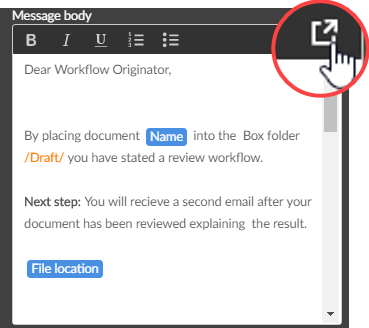Send an email
The Send an email action A tool for building the processes, logic, and direction within workflows. Actions are the steps the workflow performs to complete a process. sends a customizable email to recipients that you specify. The email originates from the workflow action, and you can customize:
- Who receives the email.
- What the email subject/message body is.
- What attachments the email includes.
Before you begin:
-
Understand Variables
-
Review allowlist IP addresses used by SendGrid. The Send an email action may execute on servers running outside your data center region. Before implementing, consider performance and regional concerns where digital boundaries are an issue.
Jump to:
Configure the send an email action
Emails from tenants with a trial license can be sent only to email addresses of domains registered in the tenant. To see the list of registered domains in your Nintex Workflow tenant, go to Settings and then select Domain management. For more information about domain management, see Domain management.
-
Add the action to the workflow and open the action configuration panel. For more information, see Add an action to the workflow.
- Type the Recipient email addresses.
Note: Use commas or semicolons to separate multiple email addresses. Do not select a null variable for the Recipient email address. Send an email will fail if a null variable is passed in the Recipient email address.
- Type the Subject of the email.
Note: Do not select a null variable for the Subject. Send an email will fail if a null variable is passed in the Subject.
- Type the Message body of the email.
To expand the message body window and to see more options in the toolbar, click  (Expand editor).
(Expand editor).
For more information on the fields and buttons, see Send an email fields, buttons, and settings.
You can configure the Send an email action to retrieve one or more file variables from previous points in the workflow and send the files as attachments.
- Open the configuration panel of the Send an email action.
- Click the File attachments field.
- Click + Variable.
- Select the file variable that you want to attach.
- Click Insert.
For more information on the fields and buttons, see Send an email fields, buttons, and settings.
Send an email fields, buttons, and settings
| Field | Description |
Variable types |
|||||||||||||||||||||||||||||||||||||||||||||||||||||||||||||||||||||||||||||||||
|---|---|---|---|---|---|---|---|---|---|---|---|---|---|---|---|---|---|---|---|---|---|---|---|---|---|---|---|---|---|---|---|---|---|---|---|---|---|---|---|---|---|---|---|---|---|---|---|---|---|---|---|---|---|---|---|---|---|---|---|---|---|---|---|---|---|---|---|---|---|---|---|---|---|---|---|---|---|---|---|---|---|---|---|
| Recipient email addresses | Email addresses for recipients of the email message that the action sends. Use commas or semicolons to separate multiple email addresses. Do not select a null variable. |
Text, Collection |
|||||||||||||||||||||||||||||||||||||||||||||||||||||||||||||||||||||||||||||||||
|
Reply to |
The email address the recipient responds to when they reply to the email address that the action sends. If you add variables to the Reply to field, the variable values must make up a single email address or the workflow will fail. |
Text, Collection |
|||||||||||||||||||||||||||||||||||||||||||||||||||||||||||||||||||||||||||||||||
|
Sender display name |
The From name in the email that the action sends. The sender display name is followed by the default sender. For example, if your Sender display name is "Marketing Team" and the default sender is nintex@workflowcloud.com, the From field in the email displays as: Marketing Team <nintex@workflowcloud.com>. If you do not enter a sender display name then the email only shows the default sender in the From field. |
Text, Decimal, Integer, Boolean, DateTime, Collection |
|||||||||||||||||||||||||||||||||||||||||||||||||||||||||||||||||||||||||||||||||
| Cc | Email addresses for the Cc line on the email message that the action sends. Cc recipients receive a copy of the task email, and all recipients can see who was included in Cc. Use commas or semicolons to separate multiple email addresses. Do not select a null variable. |
Text, Collection |
|||||||||||||||||||||||||||||||||||||||||||||||||||||||||||||||||||||||||||||||||
| Bcc | Email addresses for the Bcc line on the email message that the action sends. Bcc recipients receive a copy of the task email, but their addresses are hidden from all other recipients. Use commas or semicolons to separate multiple email addresses. Do not select a null variable. |
Text, Collection |
|||||||||||||||||||||||||||||||||||||||||||||||||||||||||||||||||||||||||||||||||
| Subject |
Subject of the email message that the action sends. Do not select a null variable. |
Text, Decimal, Integer, Boolean, DateTime, Collection |
|||||||||||||||||||||||||||||||||||||||||||||||||||||||||||||||||||||||||||||||||
| Message body |
Body of email message that the action sends. To expand the message body window and to see more options in the toolbar, click
|
Text, Decimal, Integer, Boolean, DateTime, Collection |
|||||||||||||||||||||||||||||||||||||||||||||||||||||||||||||||||||||||||||||||||
|
File attachments |
Variables representing files to attach to the email that the action sends. |
File, Collection |
























